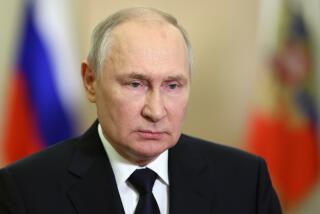Soviet Deputies Denounce ’79 Afghanistan Invasion
- Share via
MOSCOW — Soviet lawmakers, in a remarkable admission of past Kremlin wrongdoing, stood for a moment’s silence Sunday in memory of the thousands of soldiers killed in Afghanistan and then voted to denounce the country’s 1979 invasion of its neighbor and the leaders who decided to launch the war.
The resolution, approved on the final day of the second session of the Congress of People’s Deputies, was a reminder again of how eagerly the 2,250-member body has sought to air popular complaints and to take on the role, along with its legislative partner, the smaller Supreme Soviet, of a critic of Soviet society.
The Congress also voted to condemn Red Army troops for their use of deadly force in putting down a nationalist demonstration in Tbilisi, Georgia, in April of this year and to continue investigating circumstances surrounding the clash. Twenty people were killed by the troops using shovels, clubs and gas.
But before the vote was taken, about 200 deputies led by the Georgian delegation stormed out of the Kremlin’s Palace of Congresses hall in anger over a speech by chief military prosecutor Alexander Katusev, who defended the troops.
President Mikhail S. Gorbachev himself, surrounded by security men, strode into the lobby to persuade the deputies to return to their seats and to assure them that the Congress and nation as a whole mourns for those killed in Tbilisi.
The resolution on the Afghan war was the strongest official statement yet against the December, 1979, invasion. Foreign Minister Eduard A. Shevardnadze, in a foreign policy address in October, acknowledged that the nine-year war was a mistake.
The Congress, by a vote of 1,678 to 18 with 19 abstentions, said the incursion deserved “moral and political condemnation” and castigated former Soviet leaders Leonid Brezhnev and Yuri V. Andropov, President Andrei Gromyko and Defense Minister Dmitri Ustinov--now all dead--for making the decision to invade.
Andropov was head of the KGB secret police and Gromyko was foreign minister at the time of the Afghan invasion.
The decision to invade “was made by a narrow circle of people in violation of the Soviet constitution, according to which such matters belong to the jurisdiction of higher state bodies,” Alexander Dzasokhov, chairman of the committee on international affairs, told Congress in proposing the resolution.
Dzasokhov noted that the Soviet leaders had acted in an atmosphere of “excessively ideological and sharp political confrontation that characterized the international situation at the time.”
Nevertheless, he said, that “cannot justify the decision to dispatch troops.”
Dzasokhov stressed that Soviet veterans should not be condemned. “This political assessment does not cast a shadow on Soviet soldiers and officers who honestly did their duty,” he said.
Just before the vote in the Congress, Gorbachev and the deputies stood for a moment of silence.
The government released new fatality figures, saying 14,143 soldiers were killed in the conflict. The previous official death toll was 13,310.
During the debate on the violence in Georgia, conservative Politburo member Yegor K. Ligachev was named as bearing some responsibility for the deaths.
Ligachev led a meeting of top party leaders two days before the clash, and during the session, troop commanders and Interior and Defense Ministry officials were informed of “the need to provide force and means in case of dangerous and life-threatening events” in Tbilisi, according to the investigatory commission.
But Ligachev, in a letter to the commission, said he went on vacation the next day and learned about the fatal clash between troops and protesters only from a television report.
Nevertheless, commission chairman Anatoly Sobchak told the Congress: “If some leader makes a decision, I’d like to say he bears responsibility for that decision whether he finds out about its results on television or in his office.”
In a final statement before adjourning Sunday, the Congress called on the Soviet people “to close ranks behind the ideas and aims of perestroika ,” or reform, and warned against ethnic unrest, which it said “has approached a dangerous point.”
Gorbachev focused in his closing remarks on the Soviet economy, which was the main topic of discussion during the Congress sessions.
He said he viewed the decision by the Congress to approve the government’s controversial plan for economic recovery through 1995 to be a vote of confidence, “but under certain conditions.”
More to Read
Sign up for Essential California
The most important California stories and recommendations in your inbox every morning.
You may occasionally receive promotional content from the Los Angeles Times.













